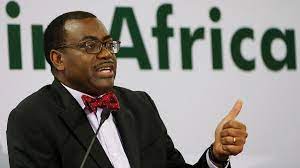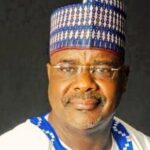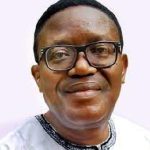BY AMOS DUNIA, ABUJA – President, African Development Bank Group, Dr. Akinwumi A. Adesina has declared that Nigeria must address the fundamental reasons for agitations, by listening, understanding, removing prejudices, and allowing for open, national dialogues, without preconditions, but with one goal: build one cohesive, united, fair, just and equitable nation for all, not for a few or for any section of the nation or religion.
This is as he also said that any society where meritocracy is subjugated to aristocracy, ethnocracy, or religiocracy shall eventually tend towards mediocrity.

Dr Adesina, who stated these while delivering a Convocation lecture at the American University of Nigeria, Yola, said that Nigerians deserve wealth and not poverty, adding that for all the abundant wealth of natural resources, Nigeria’s poverty situation is unacceptable.
He noted that today, sadly, there are way too many poor people in Nigeria, adding however that the Government is implementing bold social programs to reduce the number of poor, through interventionist programs, stressing that the fact of the matter is that poverty is not just about money.
Adesina said that Nigeria must learn from the Singaporean society’s experience that is based on meritocracy, not aristocracy, ethnocracy, or religiocracy, and forge a new way of engagement among its diverse ethnic groups and religions.
He also said that Nigeria must start managing its diversity for prosperity and drive for national cohesion, not ethnic nationalities.
According to Adesina; “We need a nation, unified by a sense of commonwealth, not a collage of ethnic nationalism. A nation driven by meritocracy, not ethnocracy, religiocracy, or aristocracy.
“One of the things that Singapore did well was to have four national languages: English, Malay, Mandarin, and Tamil. Nigeria needs to put in place the compulsory teaching of its major languages in schools, from primary through universities, to ensure multilingualism, cross-cultural understanding, and to build a strong socio-cultural capital that unifies,” he said.
Adesina said that the National Youth Service Corps (NYSC) was a very good idea as it allowed graduates from tertiary institutions to have one year of national service, largely (ideally) outside of their places of origin.
He noted that the real test, however, of the “national service” is that it often revealed the lack of diversity as after one year of service, the NYSC graduates are often not able to gain employment in governments where they served, simply because they are not indigenes of those States.
“That in itself is an irony! The young graduates are strangers in their own country. A country they pledged to serve. Opportunity is denied just because they were not born in those states! Even if they were born in those states, they are told to return to the States of their origin.
“Yet, their origin is Nigeria, not their States! In Nigeria, regardless of how long you have resided in any place, you cannot run for political offices in those states or locations, just because you were not born there.
“State governments, therefore, largely reflect nativism, not residency, which further sends a message to non-indigenes that they do not belong.
“Over time, this has created greater insularism, splintering, a lack of inclusiveness, the promotion of ethnic and religious chauvinism, instead of promoting national cohesion, trust, and inclusiveness.
“This needs to change,” Adesina stressed.
He also said that Governments must be open to representation based on nationality not on ethnicity, to build a society of mutual trust, where diversity is well managed.
Adesina said that unless someone can live in any part of the nation, work within the laws, and not be discriminated against, based on religion, race or culture, or place of birth, they will always be strangers in the nation.










